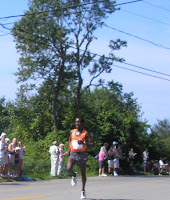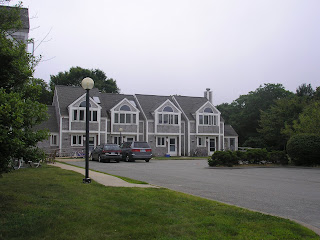7/15/09
I’m working on a longer entry to be posted soon about communicating science to the press and to the public. It’ll focus on the discrepancies between beliefs held by the science and the non-science communities. In the meantime, however, I am going to cave in under some pressure from my friends to do a follow-up on the 4th of July, the Barn Olympics, and some other goings-on around
WHOI.
Fourth of July ParadeWoods Hole has a 4th of July parade every year. Most of the participants, I’m led to believe, are form the Marine Biological Laboratory (
MBL), which is down the street from my Lab (Redfield Laboratory). The parade route goes right through the heart of the village (see aerial view of the village below, from www.whoi.edu).

This year, many of the parade groups featured depictions of marine animals (see the jellyfish and the blue lobster below)…


…while others focused on smaller biological agents, like viruses (below is an image of the virus group).
 Barn Olympics
Barn OlympicsIn one of my previous entries I told you about the Barn Olympics, but I never told you how they went. For those of you just joining us, the Barn Olympics is a day-long, fun-filled event that is organized by
Joint Program graduate students at WHOI.
This year, many grad students and summer student fellows partook in the activities, which included a photo scavenger hunt. Our team did okay in the rankings (we weren’t last) and we had a blast! I’ll share with you some of our scavenger hunt picture.
Below you’ll see my team—“the interweb”—each with a different species of flower.

Some of the more interesting tasks included interacting with tourists. Here’s our very own Sam with a tourist family in Woods Hole:
 Fish for Everyone!
Fish for Everyone!One of the summer student fellows is an avid fisherman. He fishes more than anyone I have ever met in my life (and my dad’s side of the family is from Alaska, so that’s really saying something)! The quality of his fishing experiences seems to match the quantity because last week he brought home part of a 100-something pound bluefin tuna caught up in Cape Cod Bay.
This, of course, meant sushi for everyone last Friday night when the boys dorm hosted a surf ‘n turf dinner party!
On Saturday, I was lucky enough to join fisherman Willy on the WHOI dock for a little bit of relaxed, casual fishing. I caught a very small sea bass (picture of me brimming with excitement below). We threw everything back that we caught.

Fishing was fun, but our trip to the dock was sweetened when I made a couple of new friends: the autonomous underwater vehicles (AUVs)
ABE and
Sentry! They are both WHOI submersibles and I’d never seen either vehicle in person. I took the opportunity to snap a picture of ABE:

Until next time,
Ellie

























